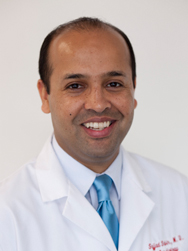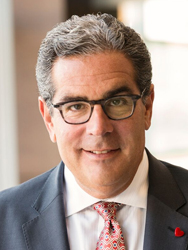Cardiac specialists at Cooper University Health Care recently achieved two recent medical firsts: The team was the first in the Philadelphia region to successfully implant Boston Scientific’s Watchman FLXTM device, and Cooper enrolled the first patient in the OPTION clinical trial involving the same device.
The Watchman FLX is the next generation of a potentially life-changing, catheter-based (or non-surgically delivered) device designed to close the left atrial appendage. The procedure works to reduce the risk of stroke in certain patients with atrial fibrillation (AFib).

Sajjad A Sabir, MD
Sajjad A. Sabir, MD, director of the Cooper Structural Heart Program, and George E. Mark, MD, FACC, of The Heart House, successfully performed the first Watchman FLXTM case in late August. In September, the team also enrolled this first patient in the OPTION trial.
The goal of the OPTION study is to determine if left atrial appendage closure with the Watchman FLXTM device is a reasonable alternative to oral anticoagulation for high-risk patients following ablation for non-valvular atrial fibrillation.
“For decades, most people with atrial fibrillation have been treated with long term blood-thinner therapy,” said Dr. Sabir. “While blood thinners can reduce the risk of stroke, they can also create complications, such as internal bleeding. Cooper is proud to be a leader in testing and using these new devices which are rapidly expanding options for patients with these conditions.”
AFib is an irregular heartbeat that can cause blood to pool and form clots in the left atrial appendage (LAA), a small pouch on the left side of the heart. For patients with non-valvular AFib, the LAA is the source of the majority of those stroke-causing blood clots. According to the American Heart Association, at least 2.7 million Americans are living with AFib. People with atrial fibrillation are five- to seven-times more likely to have a stroke than the general population.
“The Watchman FLX provides doctors with greater flexibility and safety while positioning the device in the LAA,” explained Dr. Mark, MD. “Earlier generation devices are still effective for treating the LAA; however, they aren’t appropriate for all patients due to anatomical variations. The Watchman FLX has a number of new features that make the procedure safer and also allow greater number of patients to be treated than the previous device.”
As a high volume cardiac center, Cooper has long been a leader in clinical trials and utilization of new devices for the treatment of structural heart conditions. In 2006, Cooper was one of only a select group of hospitals in the United States, including the Mayo Clinic and the Cleveland Clinic, to take part in the pilot study for the first generation WATCHMANTM device which was FDA-approved for commercial use in 2015 and in 2018, Cooper was the first in South Jersey and the Philadelphia region to participate in the Watchman FLXTM study.

Phillip A Koren, MD, FACC, FSCAI
“We are very excited to offer new treatment options to our patients, especially patients with atrial fibrillation,” says Philip A. Koren, MD, FACC, FSCAI, Medical Director of the Cooper’s Cardiac team and a leader at Cardiac Partners at Cooper and Inspira. “As an academic health system, Cooper continues to lead the way in testing new therapies for the betterment of heart health outcomes.”
Last year, Cooper and Inspira Health Network formed a joint venture, Cardiac Partners, to integrate cardiac services.
###
Wendy A. Marano
Public Relations Manager
marano-wendy@cooperhealth.edu
Office: 856.382.6463
Cell: 856.904.1688
